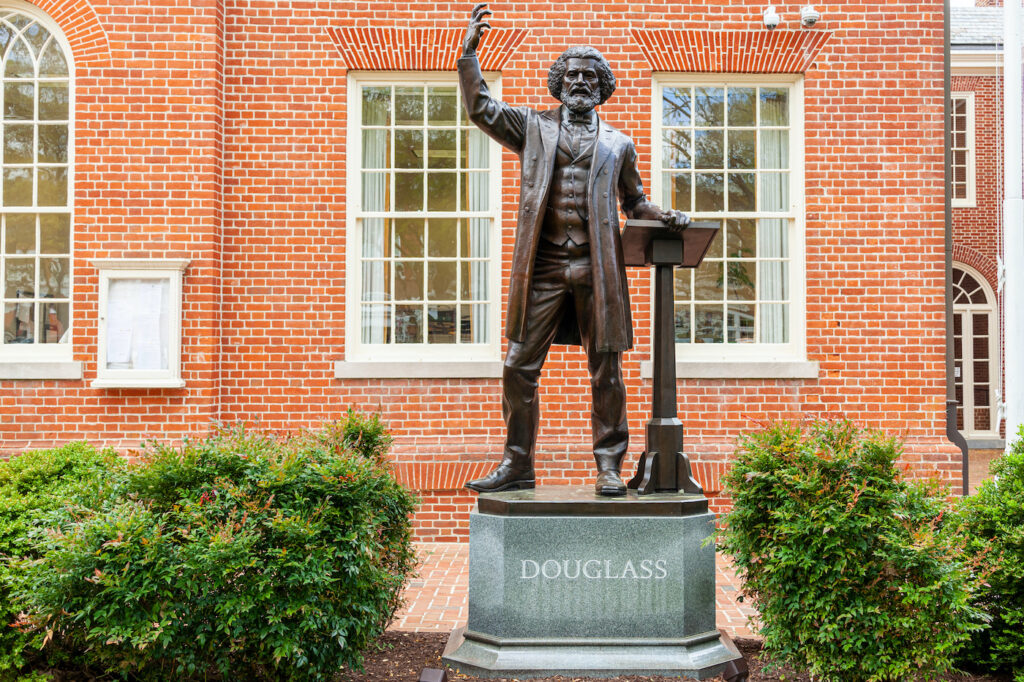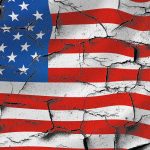Editor’s note: This year is the second time that Americans celebrate Juneteenth as a national holiday. At Public Discourse this week, we offer essays that look back on Juneteenth’s history, and look ahead to consider its place in America’s self-understanding.
Juneteenth, now a national holiday, is an opportunity for us to engage in a conversation on freedom and the American Project in a way that we have rarely, if ever, done as a national community. This might come as a surprise to many—after all, we commemorate and celebrate the Fourth of July every year with barbecues and fireworks, and this is certainly a great freedom celebration. But July Fourth can bring up mixed emotions for some of us—and I am not at all alone among African Americans who feel torn on this date.
Framing the Fourth
We are proud to be American, and do not long to live anywhere else. My father and grandfather were both in the military for much of their lives—my father having had the honor of serving on Air Force One and Air Force Two for years before retiring at the rank of Chief Master Sergeant. But we also remember, in some ways are haunted by, the fact that at that first July Fourth, and for far too many after that, we could not exercise the freedom being celebrated all around us.
Start your day with Public Discourse
Sign up and get our daily essays sent straight to your inbox.This has created some ambivalence about how to think about and commemorate the Fourth. Consider, for example, our tentative groping as parents for the best way to observe this day in our home. It was another July Fourth holiday and our children were still young, perhaps six and nine years old. I am a scholar doing historical work on race, so it is an occupational hazard for me to think deeply and carefully about such commemorations. What is the essence of the July Fourth celebration? Where were we, as African Americans, in the memory and memorialization of this world historical event? Yes, we had read of Crispus Attucks, Phillis Wheatley, and others who advocated, bled, and died for this new America—but the liberty secured for so many did not extend to our ancestors—not at that time.
And so, on that day years ago, sitting around the table, about to partake of our special July Fourth meal, we first read aloud from parts of Frederick Douglass’s speech “What to the Slave is the Fourth of July?” It is an intense text, powerful and bittersweet, as Douglass recounts the glories of the revolution while at the same time mourning the fact that the vast majority of Black Americans were still in chains. My oldest daughter, eyes wide as she listened, asked in a pleading voice: “But we can still have a happy Fourth of July, right?” I was torn, trying to determine how best to thread the needle between celebration and remembrance of a difficult past.
I ended up assuring her that yes, indeed, we could and would have a happy Fourth of July. The preliminary reading was to bring to our remembrance the path we have come through in this country, to remember and respect the work it has taken to bring us to where we are today.
Juneteenth, coming as it does just weeks before July Fourth, provides a perfect opportunity for us—both individually and collectively—to engage in a season of contemplating and celebrating the complexities and nuances, highs and lows, of this American experiment that has at its core the achievement of freedom.
My daughter’s question: “But we can still have a happy Fourth of July, right?” rings in my ears across the years. I think, in retrospect, I could have framed the day more fruitfully if I had introduced it as a remembrance—one that is part of a larger conversation on freedom that begins each year with the commemoration of Juneteenth a few weeks earlier, and culminates on July Fourth.
Juneteenth, coming as it does just weeks before July Fourth, provides a perfect opportunity for us—both individually and collectively—to engage in a season of contemplating and celebrating the complexities and nuances, highs and lows, of this American experiment that has at its core the achievement of freedom. This dialectical pairing of the two holidays is important, I would go so far as to say necessary, for a people who have yet to develop a vocabulary and practice for discussing its complicated relationship with the past—a past that includes just as much slavery, racism, and injustice as it does freedom and the pursuit of happiness.
An Annual Conversation
The annual conversation I envision taking place between Juneteenth and July Fourth should include a healthy representation of Black voices from the past who can help us to narrate and pass on our national story of freedom-seeking across the centuries. Central to this conversation are the extraordinary ideas contained in the Declaration:
We hold these truths to be self-evident, that all men are created equal, that they are endowed by their Creator with certain unalienable Rights, that among these are Life, Liberty and the pursuit of Happiness. That to secure these rights, Governments are instituted among Men, deriving their just powers from the consent of the governed, That whenever any Form of Government becomes destructive of these ends, it is the Right of the People to alter or to abolish it, and to institute new Government, laying its foundation on such principles and organizing its powers in such form, as to them shall seem most likely to effect their Safety and Happiness.
This beginning of the republic held great promise, but the vast majority of Africans in America did not yet benefit from the promises of 1776, despite the fact that many of us had supported the Revolution with both the pen and the sword.
One of these, Phillis Wheatley, was kidnapped from Africa when she was about seven years old and was a poetic genius who supported the Revolution from the home of her owners in Boston. In her letters she compared white Americans to the Egyptians who held the people of Israel in bondage. She wrote: “in every human Breast, God has implanted a Principle, which we call Love of Freedom; it is impatient of Oppression, and pants for Deliverance; and . . . that . . . same Principle lives in us.” She even penned a letter and poem of support addressed to George Washington when he was commander in chief of the Continental Army, cheering him and others on to win independence from Britain. (Washington received her letter and poem, was impressed with her, and responded in kind by letter. See the exchange here.)
Nearly one hundred year later, Frederick Douglass made his famous speech concerning the Fourth of July when he was invited by white Americans to deliver a celebratory speech commemorating the holiday in 1852. He had escaped a brutal slave owner fourteen years earlier, the wounds on his back scarred over, still visible. He brought the incongruity of the invitation to their awareness, saying:
This Fourth [of] July is yours, not mine. You may rejoice, I must mourn. To drag a man in fetters into the grand illuminated temple of liberty, and call upon him to join you in joyous anthems, were inhuman mockery and sacrilegious irony. Do you mean, citizens, to mock me, by asking me to speak to-day?
Almost a decade later, the issue of slavery finally came to a head with the Civil War and was followed by emancipation with the Union’s victory. Firsthand accounts from formerly enslaved people in Texas on that original Juneteenth help to bring alive the excitement, anticipation, and dynamism of this moment. Tempie Cummins explains how the newly freed resisted the slave owners who ignored the news of emancipation:
When freedom was declared, master wouldn’ tell them, but mother she hear him tellin’ missus that the slaves was free but they didn’t know it and he’s not going tell ’em till he makes another crop or two. When mother hear that she say she slip out the chimney corner and crack her heels together four times and shouts, ‘I’s free, I’s free.’ Then she runs to the field, against master’s will and told all the other slaves and they quit work.
Felix Haywood has one of the most vibrant and philosophical reflections on how he experienced this new freedom and what it meant to him. He had worked as a sheep herder and cowpuncher and was about ninety-two years old when he was interviewed. When he was asked how they knew that freedom had finally come he responded: “How did we know it! Hallelujah broke out—. . . ” He then burst into song and went on to share the feeling of exhilaration that pervaded the community:
Everybody went wild. We all felt like heroes and nobody had made us that way but ourselves. We was free. Just like that, we was free . . . right off colored folks started on the move. They seemed to want to get closer to freedom, so they’d know what it was—like it was a place or a city. . . .
Haywood’s image of freedom as a “place or a city” evokes larger questions and conversations about what freedom ultimately is, and how we’ll know it once we’ve attained it. Indeed, as his narrative continues, he hints at the power these questions exercised over the newly emancipated. At first, he and others assumed that they would now be rich, even richer than the whites who had owned them because they were the ones who really knew how to do the work. But then he notes: “We soon found out that freedom could make folks proud but it didn’t make ’em rich.” Haywood’s reflections here highlight the many complex dimensions of freedom—the physical dimension being just the first step toward the development of political, moral, and intellectual resources and virtues that allow us to flourish.
New National Tradition
Haywood’s reflections on the expectations and realities of freedom evoke the many times when we long for something great, but it turns out to be more compelling in the imagination than in reality. Hard work often follows once we have achieved our long-anticipated goal. This brings us to the current state of our national conversation on freedom. I think it no coincidence that the decision to make Juneteenth a national holiday followed right on the heels of Black protest that swept across the country in 2020. After much striving and protest that has reshaped the national conversation on race, what will we do now that Juneteenth has achieved the status of being a national holiday?
While the national observance is still new and nationwide traditions have yet to be formed, now is the time to initiate, to carefully cultivate, a new kind of conversation on freedom poised between the promises of the Declaration and the fitful realization of those promises across the centuries.
If we are not careful, Juneteenth may simply become something that makes African Americans “proud without making us rich,” to paraphrase Felix Haywood. Our pride in recognizing and celebrating Juneteenth may rest there without going any further. We may be left “feeling good” without coming any closer to being “rich” in the deepest sense of that word. But what we desire is the kind of richness that allows us all to live fuller lives—whatever our race or ethnicity—as we seek to better exercise and enjoy the freedoms we have fought for.
There is also the danger that Juneteenth will become a holiday observed by a small segment of the population while being largely ignored by the majority of Americans. I sincerely hope this will not be the case. While the national observance is still new and nationwide traditions have yet to be formed, now is the time to initiate, to carefully cultivate, a new kind of conversation on freedom poised between the promises of the Declaration (celebrated on the Fourth) and the fitful realization of those promises across the centuries (which emerged more fully on June 19, 1865)—and that continue to unfold in new ways today. My hope is that these weeks between Juneteenth and July Fourth will become an extended time of conversation, celebration, and contemplation of our long road to freedom.














